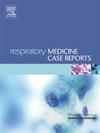派姆单抗成功治疗微卫星不稳定性高胸腺癌1例
IF 0.7
Q4 RESPIRATORY SYSTEM
引用次数: 0
摘要
胸腺癌是一种罕见的侵袭性恶性肿瘤,在发生转移的病例中,姑息性化疗是典型的治疗方法。微卫星不稳定性(MSI)高的肿瘤更可能对免疫检查点抑制剂(如派姆单抗)有反应,而不是对其他类型的化疗。然而,msi高胸腺癌极为罕见,关于派姆单抗在这种情况下疗效的报道有限。一位72岁的女性转移性胸腺癌(Masaoka期IVA)并发乳腺癌,通过活检证实msi高。随着一线卡铂和紫杉醇治疗后的进展,派姆单抗(400mg)作为第四线治疗。一个月后的CT成像显示肿瘤明显缩小,包括照射范围外的病变。在单周期派姆单抗治疗后4个月观察到持续的部分缓解。本病例证明了派姆单抗治疗MSI高胸腺癌的潜在疗效,强调了在此类病例中进行MSI检测的重要性。应考虑常规MSI评估,以确定免疫治疗的候选人。需要进一步的研究来证实派姆单抗在这种罕见恶性肿瘤中的作用,并在类似条件下建立其更广泛的适用性。本文章由计算机程序翻译,如有差异,请以英文原文为准。
Successful treatment with pembrolizumab for microsatellite instability-high thymic carcinoma: A case report
Introduction
Thymic carcinoma is a rare, aggressive malignancy, and in cases of metastasis, palliative chemotherapy is the typical treatment. Microsatellite instability (MSI)-high tumors are more likely to respond to immune checkpoint inhibitors, such as pembrolizumab, than to other types of chemotherapy. However, MSI-high thymic carcinoma is extremely rare, with limited reports on the efficacy of pembrolizumab in this context.
Case
A 72-year-old woman with metastatic thymic carcinoma (Masaoka stage IVA) and concurrent breast cancer was confirmed to have an MSI-high status through biopsy. Following progression after first-line carboplatin and paclitaxel, pembrolizumab (400 mg) was administered as fourth-line therapy. CT imaging after one month revealed significant tumor shrinkage, including lesions outside the irradiation field. A sustained partial response was observed for four months after a single cycle of pembrolizumab.
Discussion
This case demonstrates the potential efficacy of pembrolizumab in treating MSI-high thymic carcinoma, emphasizing the importance of MSI testing in such cases. Routine MSI evaluation should be considered to identify candidates for immunotherapy. Further research is needed to confirm the role of pembrolizumab in this rare malignancy and to establish its broader applicability under similar conditions.
求助全文
通过发布文献求助,成功后即可免费获取论文全文。
去求助
来源期刊

Respiratory Medicine Case Reports
RESPIRATORY SYSTEM-
CiteScore
2.10
自引率
0.00%
发文量
213
审稿时长
87 days
 求助内容:
求助内容: 应助结果提醒方式:
应助结果提醒方式:


